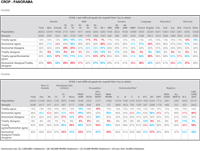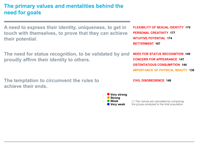One of the fundamental motivations in the psychology of individuals in modern societies is undoubtedly the need for achievement: a need for fulfillment, to progress and master high-level skills, to achieve difficult goals, a determination to win, to prevail.
The concept was popularized in the 1960s by American psychologist David C. McClelland. He concluded that in a society, the more people are driven by this need (the more "achievers" there are), the more sustained economic development and growth there will be (The Achieving Society - Princeton, D. Van Nostrand Company, Inc., 1961). Even though his theory did not go unchallenged - other factors undoubtedly influence a society's economic development - the fact remains that the presence of a critical mass of "achievers" will contribute to a society's dynamism.
Our research indicates that the "need for achievement" in the country has had its ups and downs in recent years. In 2017, the most recent year we measured this phenomenon, three Canadians in five (60%) agreed with the statement "I set difficult goals for myself that I try to attain".
Note that the most inspired, the most motivated by this need for achievement represent only 14% of the population. Nevertheless, when 60% of people agree with the statement, we reach a critical mass of "achievers" (both strong and moderate"), which sustains a certain degree of dynamism in our society.
It is also fascinating to observe this phenomenon's relationship to age. While 60% of Canadians agree with the above statement, this proportion is 75% among 18-24 year-olds. From there, agreement steadily declines in linear fashion to 47% in seniors 65 and over. As we get older, this dynamism, our need to achieve, seems to wither. A bit unsettling given our aging population!
Personal challenge and economic performance
The level of "achievers" also varies significantly by socioeconomic context, creating a very interesting indicator of society's general "mentality." During the 2000s, the need for achievement has progressed somewhat. From 2000 to 2006, as in 2017, 60% of Canadians consistently agreed with the above statement; from 2006 to 2012, the level gradually rose to 68%. The favorable economic conditions prior to the recession seem to have encouraged a certain amount of dynamism, a mentality that continued until 2012 despite the recession. During the recession, Canadians expressed some degree of resilience (several of our other indicators support this interpretation), but around 2012, this resilience began to run out of steam. At that time, Canadians gave up on the idea that life would be easier post-recession. They realized that life was becoming infinitely more complex and uncertain, that a new world order had arrived and that it was here to stay.
Thus, the level of "achievers" took a deep dive, from 68% in 2012 to 56% in 2016, a plunge of 12 points in four years! Even though the post-recession has proved no worse for most people than the recession itself (economically, socially, ecologically, etc.), our dynamism has obviously taken a hit.
However, in 2017, along with a significantly better economy, the level of "achievers" rose to 60%. While it would be unreasonable to suggest a "causal" relationship between the latest economic performance and our "achievers" measurement in the country (or vice versa), the synchronicity in the movements of these indicators is worth noting. However, since we often say in our business that "a swallow does not a summer make ," we must be cautious about this sudden rise in the level of achievers in 2017. Our next surveys on this topic will either confirm this trend, or not.

Goal-setting as a means of personal expression
It is fascinating to observe the role that goal-setting plays in the lives of the people who express a need for it. It becomes a source of meaning, a way to express who they are, to get in touch with themselves. Goals, their attainment and the way they are attained, become a way to express our uniqueness, who we are, a source of personal fulfillment, a kind of social marker. Goal-setting and challenging ourselves feed our identity, both for ourselves and as a way to communicate with others.
Indeed, goals are also about status, a way to mark one's social identity, to affirm the "strength" of one's identity.
Note, too, that these "achievers" fantasize about civil disobedience, as if to achieve their goals, any "means justify the ends"!
Goal-setting as social capital
Even though McClelland's thesis was dismissed as simplistic, too causal, people's need for achievement as a motivation remains an important driver in adding value to society, whether economic, cultural or otherwise. Given the anticipated changes in our society, it is certainly timely that a critical mass of individuals across the country are taking the bull by the horns, challenging themselves and transcending their limitation in significant ways.
Theirs will be a welcome contribution to the vitality of our society. Let's hope that the coming years will provide a favorable climate for this desire for achievement.

